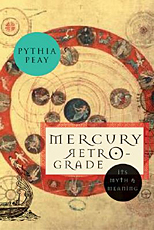"Literature, with its long and storied view of life, offers a useful paradigm for handling the vicissitudes of Mercury retrograde. Like Odysseus, like Artaban, or like the old soldier, we may be blown off course or never reach our goals at all. But if we engage the odd encounters and strange byways down which we find ourselves wandering with imagination and courage, we discover that the treasure we seek is concealed within the journey itself. Then, like the ending of all good quest stories, we may find ourselves in a place richer with meaning than anything we could have dreamed of in the first place. As Cavafy's lyric poem phrases this truth, 'Ithaca has given you the beautiful voyage. Without her you would have never set out on the road.' For this reason, struggling against the incoming and outgoing tides of change is ill-advised under Mercury retrograde. Rather, like surfers who ride the waves, or sailors who steer their ships in the direction of the wind, it is an opportunity for practicing the spiritual art of letting go — and going wherever the wind blows us.
"Reframing the impatience and frustration that arise over all the little annoying things in life that can and do go wrong is a powerful form of spiritual discipline. Acceptance for what is, rather than how our limited ego would like life to be, is a dress rehearsal for those inevitable periods of disruption in our lives when we are really faced with major life transitions. That is why spiritual practices are called 'practices.' As we practice acting out of an expanded state of consciousness instead of our usual narrow perspective, our souls are increasingly prepared for the real event — the eventual ego deaths, losses, or sudden successes when our worlds are turned upside down and inside out.
"Indeed, we can look to Mercury retrograde as a kind of life sesshin, or Buddhist retreat, in which we sit silently on the banks of the rivers of our lives simply observing events as they flow downstream. Practicing 'being Buddhas' we disengage from our attachment to things being the way we think they ought to be. 'No appointment, no disappointment,' advises Buddhist teacher Dean Sluyter in The Zen Commandments. 'If you don't build your world on expectations, it doesn't collapse when things turn out different." This is not resignation, he continues, 'but liberation. It's disillusionment in the best sense: cutting free from the illusions that have bound us. And since all our expectations are based on what has gone before, it's opening up to amazing possibilities, to that which we don't know how to expect.'
"It is in just this condition of 'beginner's mind' that new insight and growth can occur. As biologist Edward O. Wilson explains the emerging scientific paradigm of complexity theory in Consilience, systems that are in perfect internal order, such as a crystal, are finished products that cannot evolve beyond their present state. A completely chaotic system such as boiling water, however, has too little structure to allow it to change. It is the system that exists on the 'edge of chaos' — containing order, yet loosely enough structured to allow change to take place — that evolves most rapidly.
"The potential contained in the 'edge of chaos' is captured in one of my favorite novels from girlhood, The Moonspinners, by Mary Stewart. In the opening paragraphs the heroine arrives for a vacation in a small town in Greece a day ahead of her planned schedule, before her aunt is to join her. This leaves her with the delicious feeling, as Stewart writes, of 'a day dropped out of time.' That phrase, so redolent of a sense of magical expectancy, has never left my imagination. And in fact, it is during this sudden windfall of unplanned time that, in the novel, a mystery unfolds, changing the course of the heroine's life.
"If we let them, the first week to ten days of Mercury retrograde can be like 'days dropped out of time.' As often happens in this initial phrase, a twist of events may throw us off our schedules, things may fall apart, and we may find ourselves on the edge of chaos with the archetypal 'edgeman,' Hermes, as our guide. Embracing the unknown, we depart the one-dimensional flatland that our overscheduled lives can sometimes be, entering the realm of the uncanny and the unplanned."
